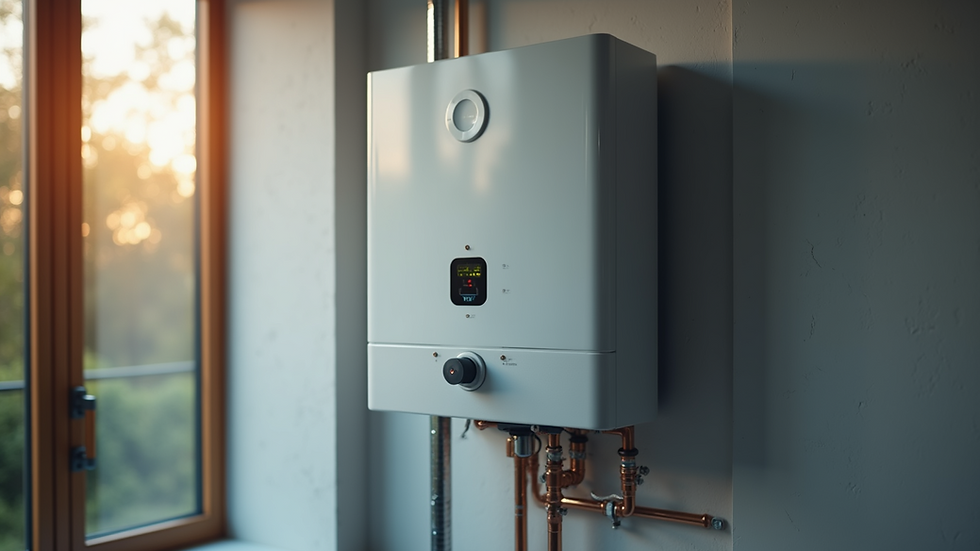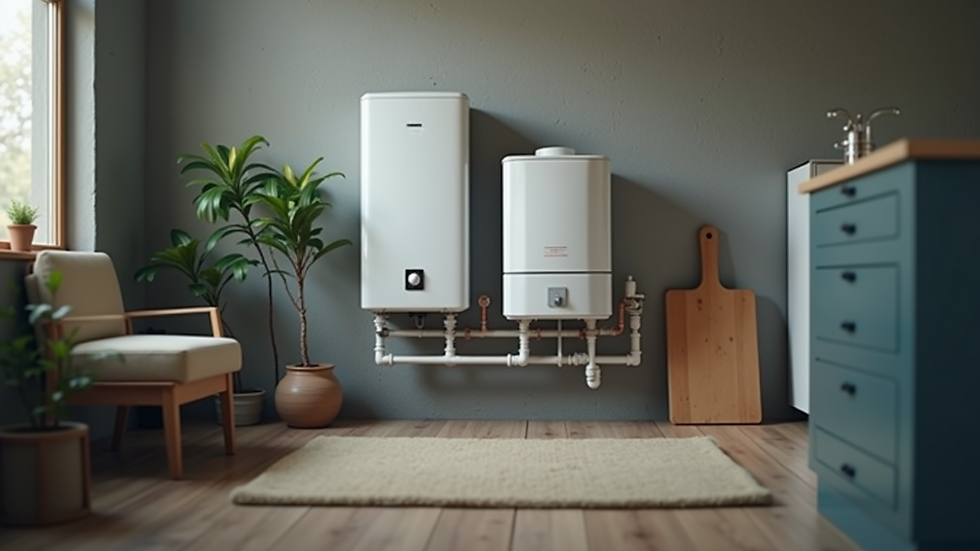Transform Your Home with a Tankless Water Heater
- Gary Lott

- Jul 9, 2025
- 5 min read
Are you tired of running out of hot water during your morning shower? Do you cringe at the thought of maintaining a bulky traditional water heater? It might be time to consider transforming your home with a tankless water heater setup. These innovative heaters provide endless hot water on demand while saving energy and space in your home. This blog post delves into the benefits of tankless water heaters, how they work, their costs, and how to install one.
Tankless Water Heater Setup
Tankless water heaters, also known as on-demand water heaters, heat water only when needed. Unlike traditional heaters, which maintain a reservoir of hot water, tankless heaters instantly heat water as it flows through the unit. This technology not only saves energy but also ensures that you never run out of hot water for baths, showers, or kitchen needs.
These systems are available in electrical and gas-powered models, with each having its own advantages. Gas models generally heat water faster and are more efficient, while electric models are easier to install and maintain. When deciding which system fits best in your home, consider factors like your energy source, your household's hot water demand, and your budget.

The compact design of tankless water heaters makes them a great choice for homes with limited space. Unlike bulky traditional water heaters, which can take up a significant amount of floor space, tankless heaters can be mounted on walls or tucked into small nooks. This way, you can reclaim valuable space in your laundry room or basement.
Benefits of Switching to a Tankless Water Heater
Switching to a tankless water heater comes with numerous benefits that can greatly enhance your home's comfort, efficiency, and value.
Endless Hot Water Supply
One of the most significant advantages of a tankless water heater is the continued supply of hot water. Traditional water heaters can run out of hot water after extended usage, leaving you waiting for the tank to refill. In contrast, tankless systems provide hot water whenever you need it, which is perfect for those busy mornings when multiple family members need hot water simultaneously.
Energy Efficiency
Energy efficiency is another factor that makes tankless water heaters appealing. According to the U.S. Department of Energy, tankless heaters can be up to 34% more energy-efficient than traditional heaters, especially for homes that use less than 41 gallons of hot water daily. This efficiency can lead to significant savings on your energy bills over time.

By reducing energy consumption, tankless systems not only save you money but also lessen your environmental impact. Since they only heat water when needed, there are no standby heat losses as seen in traditional water heaters.
Longer Lifespan
Tankless water heaters also tend to have a longer lifespan compared to their traditional counterparts. While conventional water heaters typically last around 10-15 years, tankless models can last up to 20 years or more with proper maintenance. This longevity can make a tankless heater a worthwhile investment for homeowners.
Space Saving
If you're looking to maximize your home's space, tankless heaters deliver. The compact design allows you to install them in various locations, such as under sinks, in closets, or even outside. By opting for a tankless water heater, you can free up valuable storage space for other household items.
What's the Average Cost of Installing a Tankless Hot Water Heater?
When evaluating a tankless water heater, one of the first questions homeowners often have is about the costs of installation. According to HomeAdvisor, the average cost of installing a tankless water heater can range from $1,000 to $3,000, depending on various factors.
Factors Affecting Installation Costs
Type of Heater: Gas models may cost more upfront due to their complexity and installation requirements.
Labor Costs: Hiring a professional to install your system will vary by region and can significantly impact your total expenditure.
Additional Modifications: If your home's plumbing or electrical systems need upgrades to accommodate the tankless unit, expect additional costs.
Permits: Depending on local regulations, you may need permits for installation, impacting overall costs.

Installing a tankless water heater may require modifications to your plumbing. It's important to remember that while the initial investment may seem high, the long-term savings on energy bills can offset these costs over time.
How to Choose the Right Tankless Water Heater for Your Home
Choosing the right tankless water heater is essential for maximizing the benefits they offer. Here are some key factors to consider:
Hot Water Needs
Assess your household's hot water requirements. Consider the number of appliances, showers, and faucets that run simultaneously. Most manufacturers provide flow rate guidelines, which indicate how much water the unit can heat per minute. This will help you select a model that meets your specific needs.
Energy Source
Determine whether you'd prefer a gas or electric tankless water heater. If your home is already connected to natural gas, a gas-powered heater may be more suitable and efficient. However, if you're focused on easy installation and low maintenance, an electric unit might be the better choice.
Brand Reputation
Research reputable brands and read customer reviews. Investing in a high-quality tankless water heater from a well-established manufacturer can save you money in the long run by reducing the likelihood of repairs or replacements.
Professional Installation
For best results, consider professional help for your tankless water heater installation. Experienced technicians will ensure that the system is installed correctly, optimizing performance and efficiency.
Maintenance Tips for Your Tankless Water Heater
Once you've installed your new tankless water heater, proper maintenance will help ensure its longevity and efficiency. Here are a few tips to keep in mind:
Descale Regularly: Hard water can cause mineral buildup inside your unit. Flushing it out annually will ensure optimal performance.
Check for Leaks: Regularly inspect connections and pipes for any signs of leaks or corrosion that may need to be addressed.
Adjust the Temperature: Setting the temperature to the recommended 120°F (49°C) will not only save energy but also prevent scalding and reduce the risk of mineral buildup.
Consult Professionals for Routine Maintenance: Schedule annual check-ups with a technician to address any potential issues before they become significant problems.
The Bottom Line
Transforming your home with a tankless water heater setup offers numerous benefits, including endless hot water, energy efficiency, and space savings. While the initial investment may be higher than traditional systems, the long-term savings and benefits can far outweigh these costs. By carefully selecting the right unit for your home's needs and ensuring proper maintenance, you can enjoy all of the comforts that a tankless water heater has to offer.
Begin your journey towards efficient heating today and enjoy the luxury of instant, endless hot water at your fingertips!





Comments